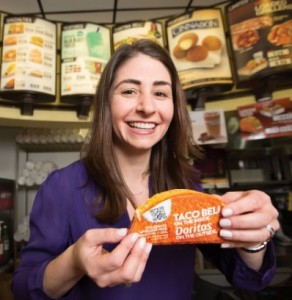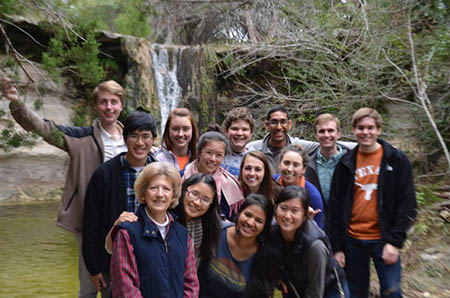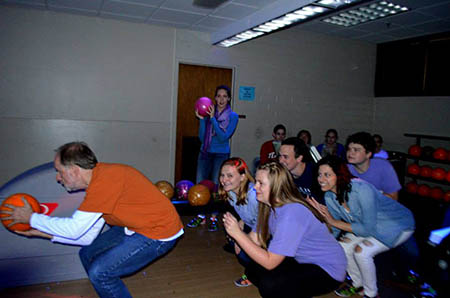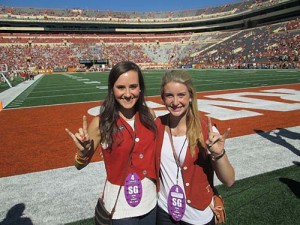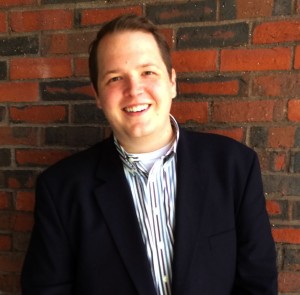 Matt Stolhandske, BHP ’06, MPA ’07, is a senior research and teaching fellow at Harvard University, where he works on a project called Recupera Chile. He is also a doctoral student at Oxford University studying economic sociology currently on a two year sabbatical to pursue his work at Harvard. After working as a consultant for McKinsey, Matt went on to pursue multiple higher degrees as well as a graduate certificate of Christian Education at Redeemer Theological Seminary. He has been heavily involved with consulting and supporting entrepreneurs in areas of poverty and disaster recovery. As a graduate student, he, along with a small team, won the first inaugural Dell Social Innovation Competition. It is astonishing what he has been able to accomplish in a mere six years since graduation.
Matt Stolhandske, BHP ’06, MPA ’07, is a senior research and teaching fellow at Harvard University, where he works on a project called Recupera Chile. He is also a doctoral student at Oxford University studying economic sociology currently on a two year sabbatical to pursue his work at Harvard. After working as a consultant for McKinsey, Matt went on to pursue multiple higher degrees as well as a graduate certificate of Christian Education at Redeemer Theological Seminary. He has been heavily involved with consulting and supporting entrepreneurs in areas of poverty and disaster recovery. As a graduate student, he, along with a small team, won the first inaugural Dell Social Innovation Competition. It is astonishing what he has been able to accomplish in a mere six years since graduation.
You have a BBA, a masters in professional accounting and in public administration, and now you are pursuing a PhD in Sociology. How are you combining all of these degrees and interests?
After the masters in accounting, I did a certificate in Urban Ministry from the seminary. I then received a master’s from Harvard in Public Administration. The business element that I took from UT is the core of what I do every day in terms of development. It has grown into a broader understanding of the challenges entrepreneurs face, especially in poverty. I work with small and medium enterprises to try to eliminate poverty. The idea of the PhD, from which I am currently on sabbatical, is to understand the role that social institutions play in entrepreneurship process. When we think about how entrepreneurs have access to capital and grow in their role, it is often not the formal mechanisms that help them. Sometimes it is family, church, or any other social institution. I am looking at how these institutions are involved in the process and which sociological factors are most related to poverty and recovery in post-disaster settings. I am currently working full-time on the Recupera Chile project as the Manager of the project through my fellowship.
Tell me more about Sinapis Group, which I believe you founded with another BHP alumnus.
I co-founded it in 2009 with Courtney Rountree, another BHP grad. I now only serve on the board for the project providing strategic guidance. Courtney is running it day-to-day. I was in Nairobi helping to set it up for a year-and-a-half working together with Courtney to do a feasibility study and actually get Sinapis off the ground. We wanted to identify the key barriers that were keeping entrepreneurs from launching their businesses, or causing them to fail. We are in the capacity building, financing and ongoing consulting/support business in the small and medium enterprise space (not micro-finance). We also provide entrepreneurs with an outlet to talk about their challenges and the resources to deal with all the barriers they identify. Courtney lives in Nairobi full time and has been massively responsible for the success of Sinapis.
You have done a variety of things since graduation. What has been the most meaningful to you, or what are you most proud of having accomplished so far?
I am proud of each of the projects. I am proud of Sinapis and grateful to Courtney for her work. I am proud of the work we have done in Chile. It demonstrates a new model in recovery – community recovery. We view the residents of that place as the world experts on how they can best recover. We collaborate with the residents of the towns and villages where we work to help us plan the recovery. We are equipping people with the tools necessary to make recovery happen and empowering them to overcome extraordinary challenges in the wake of natural disasters.
How did you get involved with Recupera Chile and what is your role with that organization?
I met Professor Doug Ahlers at Harvard and took his field course in 2011. We went to New Orleans for the course and helped with their rebuilding efforts. About that time, the Chilean government invited Ahlers to participate in a conversation about the recovery of Chile, and he asked me to help develop a course that would take 20 students to Chile in Harvard’s January term to replace the New Orleans course. I was the teaching fellow for that course and did the field work with them in Chile. Since then I have been on and off living in Chile for months at a time to work with entrepreneurs and build relationships with politicians and government workers in areas that were affected by the 2010 earthquake and tsunami in southern Chile. I have enjoyed getting to know the communities and addressing the issues they are facing. It has been a wide range of involvement from seemingly menial interventions that contribute to livelihood restoration, all the way to to large-scale economic development.
For students who may be interested in non-profit work, what advice would you have?
I would challenge the traditional understanding of non-profit. Social enterprise has shed new light on the discussion about the best way to have impact on poverty and people and communities in the developing world. For instance, the training part of Sinapis is a non-profit, but the investing arm is a capital firm, and is a for-profit. We take a hybrid approach, looking for both a social and financial return. Some students thoughts when choosing a career are focused on maximizing personal wealth. In contrast (and perhaps somewhat in reaction to profit-maximizers), other students focus on maximizing social good and ignore the dollars and cents all together. Both groups should know that there is a very real way to combine making a difference in the world with a profitable career. Do what makes you fulfilled. If you love your career in the private sector, keep doing it! You are contributing to an economic engine that makes jobs and businesses work (and, in so doing, does social good). But If you are force-feeding yourself a career at a bank or a big strategic consulting firm and long for a career where you feel you want to be more directly involved in making a difference, ask yourself how you can use the resources and knowledge you have to contribute to something that will have a direct impact on social good. Something people forget is the business sector is an inherently good thing. We don’t need to say one sector is bad and one is good. It is more about personal passion, the quality of work you produce, and the type of stuff you do each day.
You speak nine foreign languages. Which ones?
Swahili, Spanish, French, Swedish, Norwegian and then a bit of Biblical Greek, Ancient Hebrew, Japanese and Chinese. I like to learn languages when I work in different environments, and it is critical for the work I do to be able to learn them. They come and go and, with every new one, I find myself more capable of communicating in other languages in similar family trees, like Portuguese, Italian, Shona, Chewa and Gikuyu. I definitely forget some of what I learned if I am not using it. Culture is so intertwined with language, so I really love learning languages. I crave the ability to have direct conversations with people in their own languages. I think, “By learning this language, how many more people could I speak to authentically?” That thought is so motivating and empowering to me.
We hear from students who are debating going to grad school right after undergrad, or working first. What would you recommend?
I think I benefited more from my graduate experiences after having worked. I understood things in a more practical way. I also think I was able to contribute more in the programs. But I also can see that there’s value in to grad students fresh out of undergrad, especially if they are entering a new field and are using grad school to get a context for a new environment. I would also encourage students who have a real passion for academia to consider a PhD. Be thoughtful early on and consider doing it earlier rather than later. Sometimes masters programs, especially professional ones in topics like Business and Public Policy, are not necessary and do not give you any of the required coursework for PhDs in those same fields. So if it’s a PhD you want, go for it! Get your references together, find some classes that require you to write a few lengthy research papers and apply. You will likely earn a masters degree along the way.
As an undergraduate at UT, what is the best way for someone interested in making a difference in the world to have an impact?
Take full advantage of the resources at your disposal and figure out what you are passionate about. While I was there, some friends and I wanted to do some work in Mexico in the shanty towns. We found professors who were interested. It was small-scale, but it was a wonderful experience and was the start of what would eventually become my career. Students should start thinking about their passions now. Your passion can be your tagline that people remember about you. Start building that tagline in school. Have a personal growth experience and have an impact in the space you care about. Also get involved in the traditional things at UT. I balanced enjoying organizations like Texas Cowboys, the Friar Society and Longhorn Singers with school. Everyone looks back and talks about how great the years at McCombs are. Enjoy the time you are in school and your BHP friends. Find ways to help each other and learn to value those relationships. That is really important.

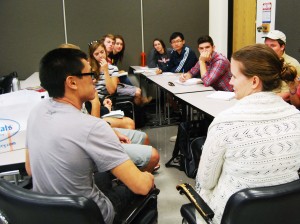
 In Dr. Burris’ management class, students competed in a Donald Trump-esque ‘Apprentice’ like challenge. Each group, consisting of BHP students and MBA students from his Power and Politics elective, was tasked with raising enough money to fund one wish for the Make-A-Wish Foundation, about $5,000, in ten days.
In Dr. Burris’ management class, students competed in a Donald Trump-esque ‘Apprentice’ like challenge. Each group, consisting of BHP students and MBA students from his Power and Politics elective, was tasked with raising enough money to fund one wish for the Make-A-Wish Foundation, about $5,000, in ten days.
